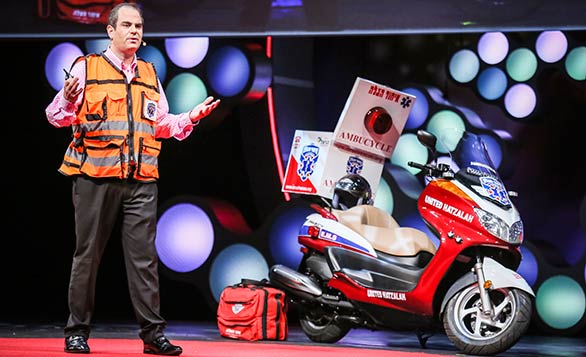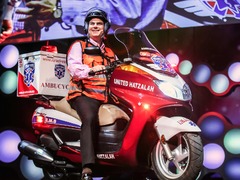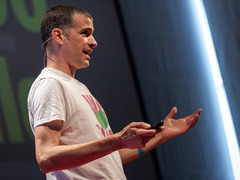
Eli Beer stands beside one of the “ambucycles” that he and other United Hatzalah EMTs ride. These Israeli volunteers are both Jewish and Muslim and provide medical care no matter what the ethnicity or religion of the patient. Photo: Courtesy of TEDMED
In today’s talk, Eli Beer explains how United Hatzalah, his organization of ambucycle-riding volunteer emergency medical responders, has shaved critical minutes off of the average emergency response time — first in Jerusalem, then throughout Israel, and now in several countries around the world.
 Eli Beer: The fastest ambulance? A motorcycle
Eli Beer: The fastest ambulance? A motorcycle
The core mission of United Hatzalah (which is Hebrew for “rescue”) is saving lives. But the organization performs another kind of rescue as well: from the sharp social divisions that so often pervade life in Israel. In United Hatzalah, Jews and Muslims volunteer their services side-by-side, dedicated to the common cause of improving emergency medical care. The organization’s volunteers provide assistance no matter what the nationality, religion or ethnicity of the person in need of help. In this way, United Hatzalah serves as an exemplary model for all of Israeli society. In June, Beer and Murad Alyan, who runs a Muslim unit of United Hatzalah, were awarded with the Goldberg Prize for Peace in the Middle East.
In his talk, Beer discusses the congested roadways that delay ambulances from reaching their destinations. But The Jerusalem Post reports that traffic isn’t the only time concern — in parts of East Jerusalem where tensions are especially high, official Magen David Adom ambulances require police escort to enter. The volunteers of United Hatzalah aren’t bound by this rule, and the organization has also taken care to address safety issues at their root: Resident Muslim volunteers personally introduce Jewish volunteers from outside the area, so that a wide range of United Hatzalah members can become familiar neighborhood fixtures and a welcome sight in the event of emergency.
 Ronny Edry: Israel and Iran: A love story?
In this same vein of courageous refusal to accept a would-be enemy is Ronny Edry’s Israel loves Iran Facebook campaign, described in his talk from TEDxJaffa. Edry, a graphic designer, inadvertently sparked a wildly popular antiwar social media campaign with a poster that read, “Iranians: We will never bomb your country. We love you.” Soon, thousands of people had created their own posters, sharing messages like “Israel loves Iran,” “Iran loves Israel” and even “Palestine loves Israel.”
Ronny Edry: Israel and Iran: A love story?
In this same vein of courageous refusal to accept a would-be enemy is Ronny Edry’s Israel loves Iran Facebook campaign, described in his talk from TEDxJaffa. Edry, a graphic designer, inadvertently sparked a wildly popular antiwar social media campaign with a poster that read, “Iranians: We will never bomb your country. We love you.” Soon, thousands of people had created their own posters, sharing messages like “Israel loves Iran,” “Iran loves Israel” and even “Palestine loves Israel.”
Though not administering lifesaving medical care, Edry and those who followed his lead took a determined stand against violence and hatred. As Israelis and Iranians came forth with personal messages of peace, they forged bonds that defy the prevailing adversarial narrative. In a CNN special, Ethan Zuckerman (watch his talk on opening your online world) writes that the campaign’s value is that “it replaces the faces of leaders with the faces of ordinary people.”
 Aicha el-Wafi + Phyllis Rodriguez: The mothers who found forgiveness, friendship
But it’s in the wake of personal loss that the ability to reach across enemy lines has its most poignant power. In a profoundly moving talk, 9/11 healing: The mothers who found forgiveness, friendship, two mothers appear together on the TED stage: one whose son was killed in the 9/11 World Trade Center attack, and one whose son was sentenced to life in prison for his role in it. Rejecting the easy path of blame and vilification, Phyllis Rodriguez and Aicha el-Wafi recognized a commonality of loss, and built a friendship to guide them on the far more difficult road to understanding.
Aicha el-Wafi + Phyllis Rodriguez: The mothers who found forgiveness, friendship
But it’s in the wake of personal loss that the ability to reach across enemy lines has its most poignant power. In a profoundly moving talk, 9/11 healing: The mothers who found forgiveness, friendship, two mothers appear together on the TED stage: one whose son was killed in the 9/11 World Trade Center attack, and one whose son was sentenced to life in prison for his role in it. Rejecting the easy path of blame and vilification, Phyllis Rodriguez and Aicha el-Wafi recognized a commonality of loss, and built a friendship to guide them on the far more difficult road to understanding.
“We have to try to know other people, the other,” says el-Wafi. “Your heart must be generous. Your mind must be generous. You must be tolerant — and you have to fight against violence.”
Comments (3)
Pingback: Befriending Foes: Talks On Setting Aside Traditional Hostilities | OccuWorld